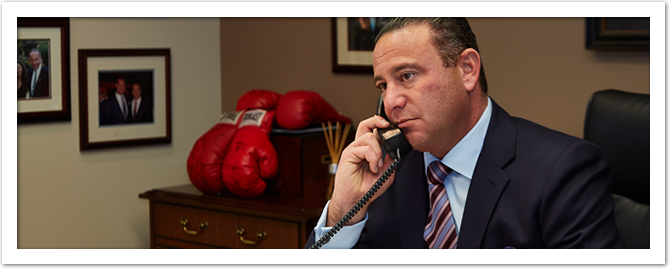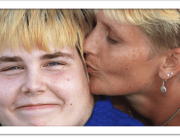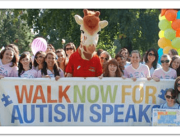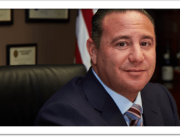From Nassau Lawyer, the Journal of the Nassau County Bar Association:
There is a crisis in educating children with autism on Long Island-one that is brought to us by the Good Intentions Paving Company. This is very personal to me because my son has been diagnosed as autistic. Here the personal becomes political and in order to insure our rights, and those of my son, we have to organize and fight for them not only in the political arena, but on the front lines in each and every school district.In writing about educating special needs kids and the law it is important to start off by saying this is less about the law per se than it is about how the law is interpreted and implemented at the school district level. School administrators on Long Island, often well-intentioned, have come a long way, but in trying to better address the needs of autistic students, they are still failing to implement best educational practices-a failure that many parents of these children remain unfortunately unaware of.
Put simply, there is a gap between the written statutes and the reality of what’s going on in the classrooms on Long Island. This gap inevitably leads to the shortchanging of children who need intensive educational services-and it is precisely at this juncture where we as lawyer/advocates belong in order to insure that the law is implemented as it was intended to be.
One of the main goals of any parent in America is for their children to receive a quality education. Parents will uproot their families to move into areas where educational opportunities are better for their kids. Even more important for any parent, however, is that their children be healthy.
Now imagine that your son or daughter has been diagnosed with autism-or any one of the variants of the disease that are subsumed under Autism Spectrum Disorders (ASD). Autism is a complex neurobiological disorder that typically lasts throughout a person’s lifetime. It is the fastest growing developmental disability in the world. The CDC reports that 1 in 68 children are diagnosed with autism, 1 in 50 school aged children, making it more common than pediatric cancer, diabetes and AIDS combined. It occurs in all racial, ethnic and social groups, and is four times more likely to strike in boys than girls. There is no medical detection or cure for Autism.
Ever since 1975 when the Individuals with Disabilities Education Act (IDEA) Act was passed our country has recognized its obligations to these challenged children. Passing a federal law, or any law for that matter, is only the first step. IDEA requires every state to issue regulations that guide the implementation of the federal law within the state. At a minimum, state regulations must provide all of the protections contained in IDEA. Some states may have additional requirements that go beyond the federal law. Many states offer handbooks or guides to help parents understand these state-specific policies and procedures.
The IDEA states that children with autism and other disabilities are entitled to a free and appropriate education (FAPE) in the least restrictive environment (LRE). Unfortunately, they don’t incorporate a clear definition of inclusion and this grey area leaves parents at the mercy of school districts with their own ideas about what are the appropriate educational methods for these special kids. At the district level, what passes for “policy” is too often a one page memo that leaves educational policy as an ad hoc process without any clear cut methodology.
It is important that parents and advocates understand that The Individuals with Disabilities Education Act (IDEA) provides specific procedural safeguards to help parents advocate for their child’s educational well-being. It promotes parents’ involvement in the education of their child and gives them the necessary tools to be key decision makers.
The federal law allows parents to participate in all meetings concerning their child, examine their child’s school records, request an independent evaluation and agree or disagree with placement decisions. The first step towards more successful policy implementation is the existence of a strong cohort of engaged parents to help motivate school officials to follow the legal guidelines.
The irony is that the districts on Long Island are trying to make things better. Their approach, however, is too often a one size fits all policy that is attempting to herd special needs kids back into the public schools from their more expensive, but extremely effective, outsourcing at private schools devoted exclusively to educating special needs children.
The narrative that the districts employ is very seductive. They talk about “mainstreaming” and “integrated classrooms” where “co-teachers” are utilized to make the special needs child feel just like any other kid. This approach can be effective when it is used for a small number of students with comparable disabilities. When a larger number of these kids with disparate skills and abilities are herded together, however, good outcomes are much harder to obtain. Mainstreaming sounds good but is not always the best approach if it isn’t properly implemented.
The problem here for Long Island is that there are 126 separate school districts, each with their own method of how to implement the protocols suggested under IDEA. Unlike NYC, where the Department of Education has developed a consistent city wide approach, Long Island’s disparate treatment of children on the autism spectrum makes it incumbent on the parent and/or the practitioner to become familiar with the specific methodology used in a particular district.
Unfortunately, many parents don’t have the requisite knowledge or the wherewithal to navigate this complicated thicket, and to fight successfully on behalf of their children who might not be getting the right educational services. Our role as lawyers is to educate the parents and advocate for their children by bringing cases that, if successful, can set legal precedents leading to policy changes that will improve the education of all special needs children in a district.
What this means is that lawyer/advocates, along with the parents of children with ASD, must constantly fight for the educational rights of these special kids-holding administrator’s hands to the fire so that schools are following the law and providing children with the education they deserve to have.
This is precisely where the legal and the political meet. On Long Island there is the Long Island Advocacy Chair for Autism Speaks, one of the nation’s largest autism advocacy organizations. When particular legal issues arise, it is a huge help to practitioners to have an organized advocacy group that can buttress individual legal claims. It goes without saying that administrative officials will respond to political pressure and grass roots advocacy efforts, and lawyers practicing in this field would be well-advised to develop strong ties to the advocates who posses both a deep reservoir of important information, as well as necessary political will.
All children with special needs are a unique kind of special interest. How we treat these kids helps to define us as a society. Our legislators have recognized this, but lawyer/advocates need to insure that vigilance is maintained at the school level to insure that the promise of the law, and the righteous hopes of parents, are actually realized.
Read more From Nassau Lawyer, the Journal of the Nassau County Bar Association…







Leave A Comment